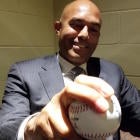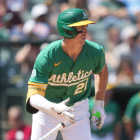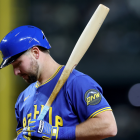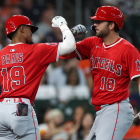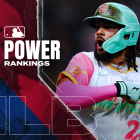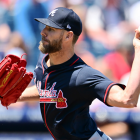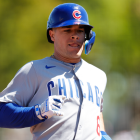HOUSTON -- On Saturday at Minute Maid Park, Major League Baseball and presenting sponsor The Hartford announced that Kenley Jansen of the Dodgers won the 2017 Trevor Hoffman National League Reliever of the Year Award and that Craig Kimbrel of the Red Sox won the the 2017 Mariano Rivera American League Reliever of the Year Award. Rivera, the greatest closer in baseball history, was among those on hand to present the awards, and he took a few minutes to talk to CBS Sports.
Rivera, now 47, pitched to an absurd 205 ERA+ across parts of 19 big-league seasons for the Yankees. Along the way, he set the all-time record with 652 saves and established himself as a playoff legend (0.70 ERA in 141 playoff innings). Rivera will debut on the Baseball Hall of Fame's BBWAA ballot in 2019, and he'll almost certainly be elected on the first ballot. Rivera was famous for his cutter, which surely stands as one of the great single pitches in the annals of the game.
CBS Sports: So the story goes that you accidentally discovered your cutter while throwing with Ramiro Mendoza?
Mariano Rivera: No, it was no accident. No one taught it to me, but God gave it to me. I was throwing a four-seam fastball, just like I'd done all my life since I was 6 years old. That day that ball just started cutting.
CBS: So you don't know what you were doing to get that movement?
Rivera: I didn't do nothing. It just started doing it. I was throwing the ball from every angle, checking it to see if it was scuffed or something. I changed the ball a few times, but it was still doing the same thing, cutting. Always doing the same.
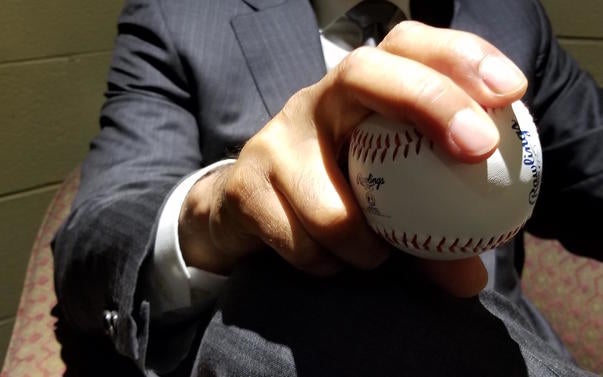
CBS: This would've been '97?
Rivera: '97, when I became the closer.
CBS: In '96 you had that great season, but you weren't throwing the cutter.
Rivera: No, it was the fastball in '96, four seams. The same grip, and it was doing what it was supposed to do. Then in '97 everything changed -- for the good.
CBS: I would say so. In '96 you threw so many relief innings, more than 100. Is that something you think you could've kept doing? You moved into the closer's role, so you didn't throw as many innings, but in '96 you proved you could handle a heavy relief workload, the kind we don't see anymore.
Rivera: Yeah, I mean when you're a reliever you don't care. You don't think about innings, you just do what they tell you to do. If you have to throw one inning, you do it. If you have to throw three innings, you do it. You just want to do it right. Thank God everything was right in '96, and I was able to get that job the next season, although I wasn't looking for it. It was just my second year in the big leagues, and I was just happy to be there.
CBS: Early in your career, you got sent down to the minors, but you picked up a lot of velocity while you were down there. How did you achieve that?
Rivera: Well, I ate a lot of fish. My shoulder was sore when they sent me down, and I rehabbed and got healthy. That's what happened. When you're healthy, a lot of good things happen. On July 4, I made it back to the majors and pitched a good game against the White Sox.
[Note: He's right. On July 4, 1995, he was recalled and tossed eight shutout innings against the White Sox.]
CBS: These days, everyone's talking about different bullpen usage in the playoffs. But you were doing this, too, in your day. You had more than 240 multi-inning outings in regular season career and then had a bunch in the postseason.
Rivera: Oh yeah, I did that. Playoffs? I don't remember when I went only one inning. A lot of times I was throwing two-plus.
CBS: Was that hard on your arm?
Rivera: You don't think about it, especially back then. Playoffs, World Series? You don't think about it. You just go and do it. The season's almost over, so whatever you have left you have to use it. When you get in the World Series, you get re-energized. You feel different. I'm talking about myself, but I think that's how most pitchers feel. I felt great. I think the cold weather helped me feel better during the playoffs.
CBS: Let me ask you about pressure. A lot of writers and fans like to declare that certain guys can and can't handle pressure. But if you make the majors, doesn't that mean you can by definition handle pressure? Wouldn't you get weeded out way before making the big leagues if you can't cope with pressure? Is there anybody who makes the majors without being able to handle pressure?
Rivera: No, I don't think so. But pressure is a moment. Playoffs bring a lot of pressure.
CBS: Did you do anything differently to get your mind ready for that playoff pressure?
Rivera: Knowing that you're in the playoffs, that's pressure. But knowing that it's where you want to be helps. Some people don't handle that well, some do. It's not regular season baseball. It's World Series baseball. It's the same game, but it's different.
CBS: You don't have to tell me names, but did you ever play with anyone who you thought didn't handle playoff pressure well?
Rivera: Not really. I was blessed with my teammates. You can't really know that, anyway. It's not something you think about. Pressure just happens.
CBS: You didn't pitch a lot as a kid, right?
Rivera: I wasn't a pitcher. I played every position. I always played baseball but not as a regular pitcher. I pitched a little in Little League and later as an amateur. I pitched, but I wasn't a pitcher. So when I came to the pros, I didn't have that many miles on my arm before I signed.
CBS: Do you think that's a better way to approach it at the youth level?
Rivera: I don't think so. The more you throw, the better you will be if you make sure that you protect your arm. Kids now are throwing in more than one league. That's dangerous. So they have 50 throws in this league but then 50 in another and maybe 50 in another. That's adding a lot to it, for a young kid who hasn't developed yet.
CBS: How'd you get your cutter to move so differently?
Rivera: I just told you. It's just a four-seamer, man.
CBS: I mean, sometimes it was like a slider that didn't drop. Sometimes it was like a straight fastball that just moved a little glove-side at the end. It was a lot of different pitches in one, right?
Rivera: There was some different finger pressure sometimes, but usually I just threw it over the plate.
CBS: Baseball may want to cut down on mound visits between the catcher and the pitcher. What do you think about that?
Rivera: If I'm pitching, that would never happen. That's baseball. You cannot tell the pitcher and catcher not to talk, or to have only two visits or whatever.
CBS: So when Jorge Posada or whoever would come out to talk to you, that actually helped you?
Rivera: Of course. He's giving me advice. He's giving me something that I don't see or something that I forgot. So he's got to go out there. What's he going to do, scream it?
CBS: So we're probably about, what, five hours before a closer is needed in this game? Do you think right now you could get some major-league hitters out?
Rivera: No.
CBS: No?
Rivera: Because you'll tell some people. You might be saying, "Hey, he said he can still get hitters out," and then they'll be calling me.
CBS: I wouldn't do that.
Rivera: No, man, I'm done.
![[object Object] Logo](https://sportshub.cbsistatic.com/i/2020/04/22/e9ceb731-8b3f-4c60-98fe-090ab66a2997/screen-shot-2020-04-22-at-11-04-56-am.png)









